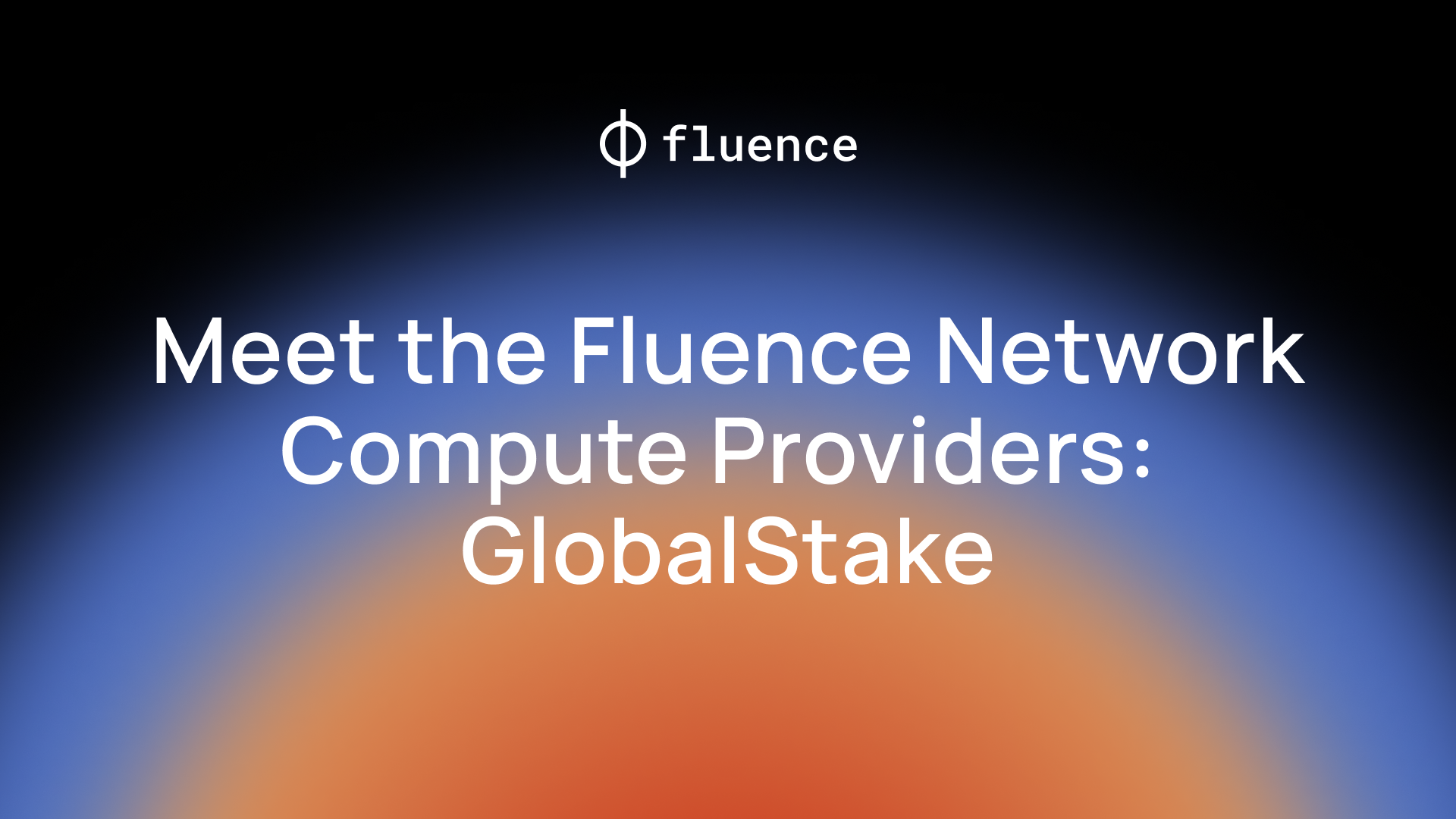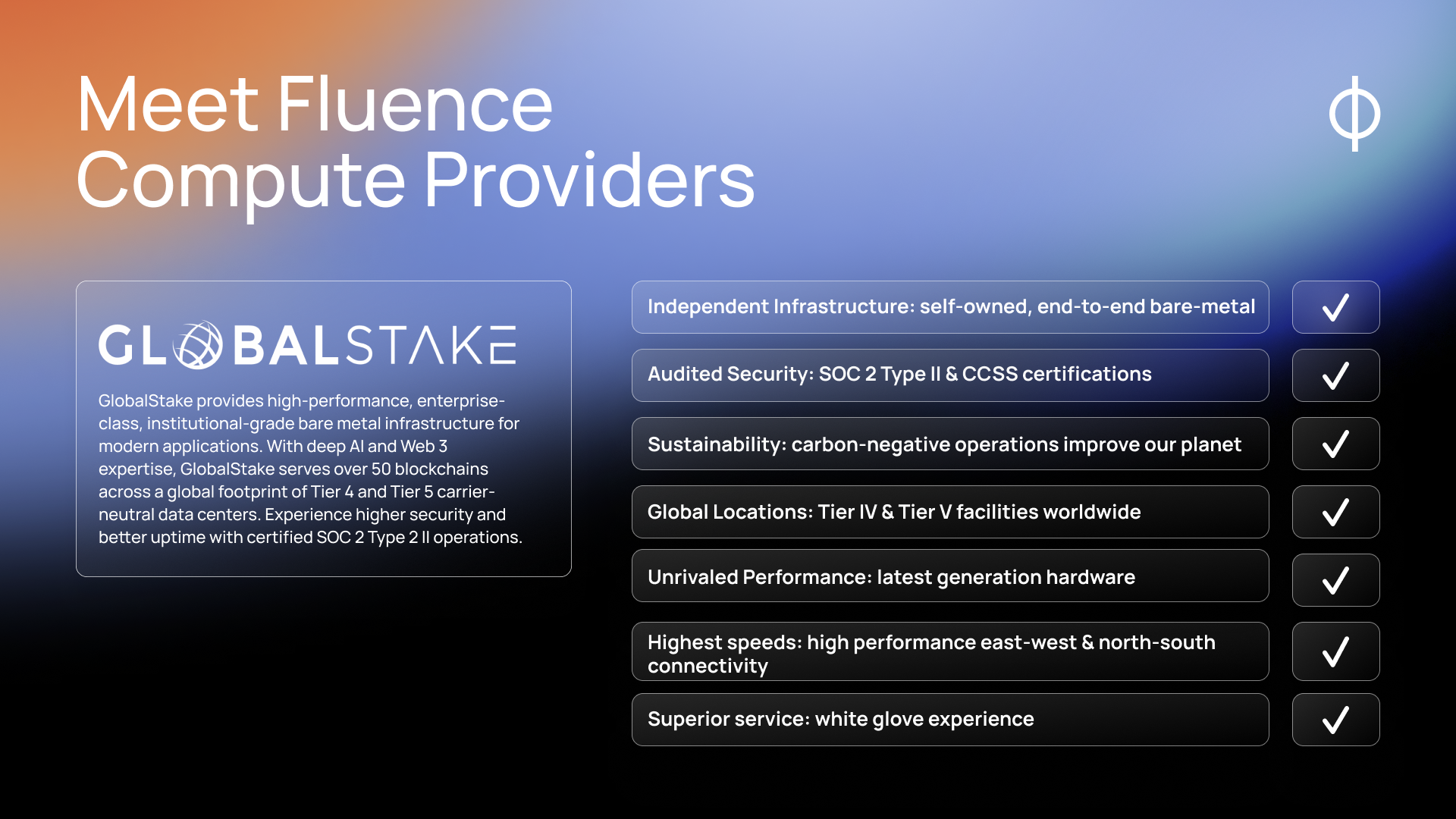Meet Fluence Compute Providers: GlobalStake

In September, we publicly launched FLT Staking, taking a significant step toward building a cost-effective, enterprise-grade compute platform with global accessibility. As we continue to scale the network, we're steadily expanding our pool of compute providers and improving server availability. In this article series, we will introduce the top-tier compute providers with whom we have partnered. These partners provide our customers with premier DePIN compute resources at prices up to 80% lower than traditional cloud providers.
This time, we met with GlobalStake, a carbon-negative infrastructure provider located in tier 4 & 5 data centers across the globe, committed to decentralising stake and jurisdiction. Let's learn more about them!
Why did you choose to join the cloudless movement and Fluence Network?
GlobalStake believes in the future of decentralized physical infrastructure networks (DePIN), from validating blockchain protocols to storage systems that compete with centralized cloud providers and hyperscalers. In the case of Fluence in particular, and as infrastructure providers who proudly run fully owned bare metal, we could not ignore the economic opportunity to deploy excess compute that could benefit others.
What are the strategic and business advantages that working with Fluence is bringing to your company? What do you value about Fluence, and what makes our protocol appealing or unique?
Deploying excess capacity to the Fluence network is a win-win scenario for the protocol, users, and GlobalStake. We supply the needed compute for Fluence end users while simultaneously earning a return for servers that otherwise would be awaiting other deployments. What we particularly value about Fluence is its recognition of the problem of centralized services. GlobalStake consists of decentralization “maxis” who are striving to build out a network that is not under the control of big tech, and the plan is to operate data centers on every habitable continent by the end of next year (2025).

What was your infrastructure set up before joining Fluence?
Nothing has changed before or since joining Fluence because we have been building and operating GlobalStake in an entirely antithetical way to hyperscalers such as AWS, Microsoft Azure, and Google Cloud. Though admittedly CapEx-heavy and time-intensive, the investment in becoming SOC-2 compliant and running our wholly owned bare metal infrastructure in Tier 4 / Tier 5 data centers will pay for itself in the coming years. The robustness of our infrastructure is complemented by a commitment to security through SOC 2 Type 2 and CCSS compliance, which separates GlobalStake—the only self-hosted and self-managed bare metal infrastructure provider in the entire Web3 industry.
Describe how your infrastructure, location, and operations look like now.
Our highly performant bare metal infrastructure is located in various locations around the globe–our most significant presence is in the Washington DC metro – with other US locations such as Phoenix, Dallas and Cheyenne. Globally, we are in Amsterdam and deploying in Buenos Aires, Argentina, Dubai, UAE, and Tokyo, Japan.In terms of operations, much like our hardware, our team is globally distributed and can nimbly respond to updates to protocols when the need arises. Moreover, in addition to our internal SOC 2 compliance audit and exceptional OpSec practices, we are completing our CCSS audit, a highly specialized certification specific to the blockchain industry.
How do you see the DePIN space and your role in it now? How about in 5 years?
Our team is incredibly excited for the future of the entire DePIN space. We started as a staking service provider and operate on over 50 chains. We have also grown to become one of the leading storage providers and fully embraced DePIN's decentralized storage sector. With over 150 Petabytes of storage, we are very active in Arweave, Filecoin, and Mysten Labs’ rollout of Walrus.
Looking five years into the future, we believe DePIN will continue to grow exponentially as it is the critical base layer of a new economy. It will likely thrive across several sectors, especially as regulatory clarity emerges. Decentralized solutions provide robustness and resiliency to networks. They drive down costs as greater competition forces centralized providers to improve inefficiencies to thrive in this new environment of choices.
Finally, what is your advice for any company out there considering joining Fluence?
Meet the team and chat with them. Read the documents and understand the vision. And if your company has additional available compute units, why not become part of the Fluence Network to help end users while adding to your bottom line?
What's next?
- To start staking, secure an NFT from the Fluence NFT marketplace and head to our Staking App.
- For staking via Parasail Delegation Pool, read the guide.
- Find out more details on FLT Staking in this blog post.
- To join our provider network waitlist, visit our provider network page.

